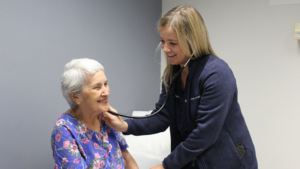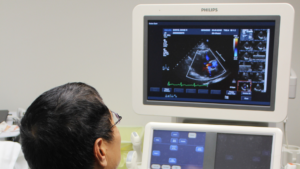Top Cardiologists in Fort Worth, TX
What We Do, We Do From The Heart
Cardiology Clinic Services
Our team of highly trained cardiologists in Fort Worth, TX, evaluate and treat adult cardiovascular conditions including:
- Heart disease
- High blood pressure
- Congestive heart failure
- Heart blockages/heart attack
- Heart rhythm disorders
- Heart valve disease
- Post-COVID cardiac issues and evaluation
- Blood vessel and circulation problems
Cardiologists Near Downtown Fort Worth, Texas
Interventional Cardiology
Minimally invasive procedures can relieve symptoms and help prevent heart attack or stroke. Using the latest technology, we help patients avoid major surgery.
HSC Health Cardiologists in Fort Worth, TX
If you’ve experienced a stroke, heart attack, hypertension, or another type of cardiovascular distress, you can rest assured that your heart is healthy after testing and imaging with our experienced cardiology team.
Taking care of your heart doesn’t have to mean surgery.
With cutting-edge technology and minimally invasive interventional cardiology, we can prevent further damage to the heart without major surgery and long recovery times.
Heart disease is the #1 killer of Americans annually. Do you have a cardiologist?
Find a Cardiologist in 3 Easy Steps
1. Call 817-735-7622
First, establish care with a cardiologist or have your primary care provider send a referral.
2. Gather Information
Next, we’ll schedule a consultation to recommend further testing, imaging, or make a diagnosis.
3. Be Well
When it comes to matters of the heart, there’s no time to delay. If you experience symptoms related to your heart, call your doctor right away.

★★★★★
Our Patients Are Saying…
★ “Dr. Kline is amazing. I’m lucky to have him treat me and y’all are lucky to have him in your employ, both as a doctor and as a professor of medicine!“
★ “I really appreciate the time and patience of Laine Markham during this visit. She took the time to answer all my questions and cleared up some misconceptions I had about my A-Fib. I hope to keep Laine for any future cardiology visits. This was a very pleasant and informative visit.“
Our Fort Worth Cardiologists
Cardiology Frequently Asked Questions
A stress test is usually beneficial for patients who have symptoms of coronary artery disease with multiple risk factors. This is an easy way to see if there is a possible coronary artery blockage. The test may involve walking on a treadmill with a progressive increase in difficulty while monitoring the heart rate and rhythm. If you are unable to walk on a treadmill, it may be done with medication instead. Stress testing usually involves echocardiography or nuclear scanning for an accurate diagnosis.
An echocardiogram (echo) uses reflected sound waves to create a model of the heart and all of its valves with a probe through the chest wall or esophagus. The heart chambers may then be analyzed for size and function. This testing provides precise information and might be paired with stress testing to give your provider all the data needed to make a diagnosis.
Blood pressure should be less than 120/80, with the higher number (systolic) referring to the peak pressure by a contracting heart, and the lower number (diastolic) referring to the blood flow when the heart is relaxed. High blood pressure is the leading cause of stroke in the US. Medication is usually required to regulate blood pressure, along with weight loss and reducing sodium in the diet.
A heart murmur is an audible sound that can be heard when blood passes through the heart, usually caused by the narrowing or leaking of a valve. Heart valve issues may be mild and require monitoring, or serious and require surgical intervention.
Most people know cholesterol as the fatty build-up that is deposited in the arteries, creating blockages to the heart and other vital organs, but cholesterol is not all bad. Good cholesterol is called HDL and bad cholesterol is LDL and the total numbers and ratios of these will contribute to your risk for plaque buildup in the arteries. Triglycerides are another factor to consider. Triglycerides are fats within the body that can result in the formation of bad cholesterol. Your provider uses information from lipid blood test results about factors in your cholesterol to create a full picture of your cardiovascular health and create a plan for treatment.
A heart attack occurs when an artery is blocked suddenly, causing the heart muscle tissue to die. This blockage is typically due to a clot blocking an artery that already has plaque buildup from cholesterol. The most common symptoms include
- Chest, arm, or neck pain
- Shortness of breath
- Nausea
- Exhaustion
- Feeling faint or light-headed
As soon as these symptoms begin, you should contact a medical professional for evaluation. Cutting-edge technology allows us to preserve heart muscle and function, especially if symptoms are addressed quickly.
If blood flow is interrupted to an area of the brain or there is bleeding in the brain, it can cause the death of brain tissue, resulting in a stroke. Adults commonly suffer a stroke due to interrupted blood flow to the brain. Stroke is the number one complication related to long-term high blood pressure or hypertension that has been untreated or poorly treated.
A stroke can be caused by vascular disease or as a result of passing blood clots from arteries in the neck, chest, heart, or aorta.
Some signs of a stroke include:
- Sudden numbness or weakness in the face, arm, or leg, especially if only on one side of the body
- Sudden confusion
- Difficulty speaking
- Difficulty understanding speech
- Sudden trouble seeing in one or both eyes
- Sudden trouble walking
- Dizziness, loss of balance
For almost all patients with heart disease, over-the-counter medications that are considered “decongestants” must be avoided. Decongestants make the blood vessels constrict, which can be especially dangerous for those with hypertension. Your cardiologist or pharmacist will be able to help you find a cold medicine that can help while protecting your heart.
Fort Worth Heart and Vascular Care
Our experienced and compassionate cardiologists are accepting new patients in the North Texas area. Call 817-735-7622 to schedule an appointment.
Location
855 Montgomery St, 3rd Floor
Fort Worth, TX 76107
817-735-7622
Clinic Hours
Monday – Friday
8 am – 5 pm
Appointments
Give us a call at 817-735-7622 or click here to schedule online.









Social media